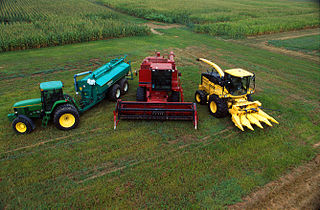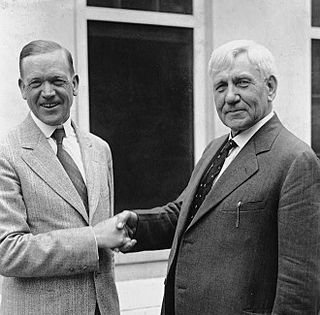The following outline is provided as an overview of and topical guide to agriculture:

The Fordney–McCumber Tariff of 1922 was a law that raised American tariffs on many imported goods to protect factories and farms. The US Congress displayed a pro-business attitude in passing the tariff and in promoting foreign trade by providing huge loans to Europe. That, in turn, bought more US goods. However, five years after the passage of the tariff, American trading partners had raised their own tariffs by a significant degree. France raised its tariffs on automobiles from 45% to 100%, Spain raised its tariffs on American goods by 40%, and Germany and Italy raised their tariffs on wheat. According to the American Farm Bureau, farmers lost more than $300 million annually as a result of the tariff.

The United States Department of Agriculture (USDA), also known as the Agriculture Department, is the federal executive department responsible for developing and executing federal laws related to farming, forestry, rural economic development, and food. It aims to meet the needs of commercial farming and livestock food production, promotes agricultural trade and production, works to assure food safety, protects natural resources, fosters rural communities and works to end hunger in the United States and internationally.

Agronomy is the science and technology of producing and using plants in agriculture for food, fuel, fiber, recreation, and land restoration. Agronomy has come to encompass work in the areas of plant genetics, plant physiology, meteorology, and soil science. It is the application of a combination of sciences like biology, chemistry, economics, ecology, earth science, and genetics. Agronomists of today are involved with many issues, including producing food, creating healthier food, managing the environmental impact of agriculture, distribution of agriculture, recreation surfaces, and extracting energy from plants. Agronomists often specialize in areas such as crop rotation, irrigation and drainage, plant breeding, plant physiology, soil classification, soil fertility, weed control, turfgrass and insect and pest control.
Agroecology (a-grō-ē-ˈkä-lə-jē) is an applied science that studies ecological processes applied to agricultural production systems. Bringing ecological principles to bear can suggest new management approaches in agroecosystems. The term is often used imprecisely, as the term can be used as a science, a movement, or an agricultural practice. Agroecologists study a variety of agroecosystems. The field of agroecology is not associated with any one particular method of farming, whether it be organic, regenerative, integrated, or conventional, intensive or extensive, although some use the name specifically for alternative agriculture.
Managerial economics is a branch of economics which deals with the application of economic concepts, theories, tools, and methodologies to solve practical problems in a business. Managerial economics analyzes the economic implications of short- and long-term planning decisions. Its theory mainly focuses on demand, production, cost, markets, and other similar factors. In other words, managerial economics is a combination of economics theory and managerial theory. It helps the manager in decision-making and acts as a link between practice and theory. It is sometimes referred to as business economics and is a branch of economics that applies microeconomic analysis to decision methods of businesses or other management units.
Agricultural economics is an applied field of economics concerned with the application of economic theory in optimizing the production and distribution of food and fiber. Agricultural economics began as a branch of economics that specifically dealt with land usage, it focused on maximizing the crop yield while maintaining a good soil ecosystem. Throughout the 20th century the discipline expanded and the current scope of the discipline is much broader. Agricultural economics today includes a variety of applied areas, having considerable overlap with conventional economics. Agricultural economists have made substantial contributions to research in economics, econometrics, development economics, and environmental economics. Agricultural economics influences food policy, agricultural policy, and environmental policy.
The Australian Bureau of Agricultural and Resource Economics and Sciences (ABARES) is a federal research branch of the Australian Government Department of Agriculture, Water and the Environment, located in Canberra, Australia. ABARES was established on 21 August 1945 as the Bureau of Agricultural Economics (BAE), and is also involved in commercial consultancy. It was merged with the Bureau of Rural Sciences (BRS) in 2010. The main role of ABARES is to provide "professionally independent data, research, analysis and advice that informs public and private decisions affecting Australian agriculture, fisheries and forestry”. ABARES maintains the AgSurf database which includes farm survey data on farm performance, production benchmarks, farm management, socioeconomic indicators relating to the grains, beef, sheep and dairy industries in Australia. ABARES has received funding from business and industry groups. ABARES' website notes that "Over half of ABARES' external revenue is derived from commercial consulting work."

The Economic Research Service (ERS) is a component of the United States Department of Agriculture (USDA) and a principal agency of the Federal Statistical System of the United States. It provides information and research on agriculture and economics.

Theodore William Schultz was an American economist and chairman of the University of Chicago Department of Economics. Schultz rose to national prominence after winning the 1979 Nobel Memorial Prize in Economic Sciences.

Agribusiness is the business of agricultural production which involves the production, protection, sales and marketing of the product to satisfy the customers need. The term is a portmanteau of agriculture and business and was coined in 1957 by John Davis and Ray Goldberg. It includes agrichemicals, breeding, crop production, distribution, farm machinery, processing, and seed supply, as well as marketing and retail sales. All agents of the food and fiber value chain and those institutions that influence it are part of the agribusiness system.

The National Agricultural Statistics Service (NASS) is the statistical branch of the U.S. Department of Agriculture and a principal agency of the U.S. Federal Statistical System. NASS has 12 regional offices throughout the United States and Puerto Rico and a headquarters unit in Washington, D.C.. NASS conducts hundreds of surveys and issues nearly 500 national reports each year on issues including agricultural production, economics, demographics and the environment. NASS also conducts the United States Census of Agriculture every five years.

The McNary–Haugen Farm Relief Act, which never became law, was a controversial plan in the 1920s to subsidize American agriculture by raising the domestic prices of farm products. The plan was for the government to buy the wheat and then store it or export it at a loss. It was co-authored by Charles L. McNary (R-Oregon) and Gilbert N. Haugen (R-Iowa). Despite attempts in 1924, 1926, 1927, and 1931 to pass the bill, it was vetoed by President Calvin Coolidge, and not approved. It was supported by Secretary of Agriculture Henry Cantwell Wallace and Vice President Charles Dawes.

Czech University of Life Sciences Prague is a university of agricultural education and research in Prague, the Czech Republic, established in 1906.
Agriculture in Lithuania dates to the Neolithic period, about 3,000 to 1,000 BC. It has been one of Lithuania's most important occupations for many centuries.
Henry Charles Taylor was an American agricultural economist. As an early pioneer in the field, he has been called the "father of agricultural economics" in the United States. Taylor established the first university department dedicated to agricultural economics in the United States in 1909 during his time at the University of Wisconsin–Madison. He also had a brief but very influential career in the United States Department of Agriculture from 1919 to 1925, where he helped reorganize its offices and became head of the new Bureau of Agricultural Economics. Coming from a rural farm community himself, Taylor's foremost goal was always to try to improve the living conditions of farmers.
The definition of a small farm has varied over time and by country. Agricultural economists have analyzed the distinctions among farm sizes since the field's inception. Traditional agricultural economic theory considered small farms inefficient, a stance that began to be challenged in the 1950s. An overview of research published by the World Bank in 1998 indicated that the productivity of small farms often exceeded that of larger ones.
Jock Robert Anderson is an Australian agricultural economist, specialising in agricultural development economics, risk and decision theory, and international rural development policy. Born in Monto, Queensland, he studied at the University of Queensland, attaining bachelor's and master's degrees in agricultural science. After graduation, Anderson joined the Faculty of Agricultural Economics at the University of New England. At New England, he focused on research in farm management, risk, and uncertainty and received a doctor of philosophy in economics in 1970. In 1977, Anderson co-authored a book, Agricultural Decision Analysis, which has served as an influential source on risk and decision analysis for agricultural economics researchers and the agricultural industry.
Hazel Kyrk (1886–1957) was an American economist and pioneer of consumer economics.

Virginia Claypool Meredith was an American farmer and livestock breeder, a writer and lecturer on the topics of agriculture and home economics, and an active clubwoman and a leader of women's organizations. Dubbed "Queen of American Agriculture" by the citizens of Mississippi in the 1890s, Meredith was also a pioneer in agricultural education. Between 1897 and 1903 she established the home economics programs at the University of Minnesota and served as the program's first professor. From 1921 to 1936 she served as the first woman appointed a Purdue University trustee. Meredith chose an unusual vocation for women of her time, successfully managing the day-to-day operations of her family's Indiana farm from 1882 until 1915. In addition to her agricultural-related work, Meredith was appointed to the Women's Board of the 1893 World's Columbian Exposition, serving as vice chair of the Women's Board and chair of its awards committee. She was also elected president of the Indiana Union of Literary Clubs, a founder of the Indiana Federation of Women's Clubs, and the first president of the Indiana Home Economics Association, founded in 1913.








